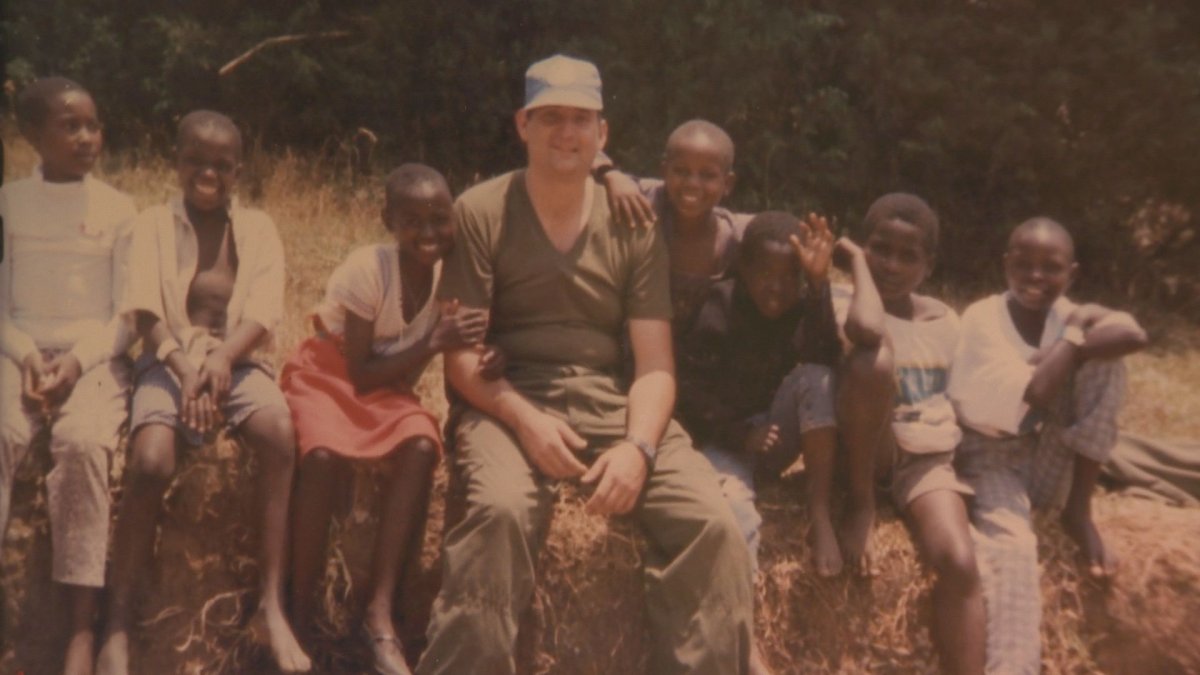Warren Webber has three biological children but several years ago he acquired a fourth child.

“For all intents and purposes, he is my son,” Webber told Global News. “I love him just the same as my other three children.”
Webber is talking about Sunday Justin Nzitatira–a Rwandan genocide survivor.
Webber is a Kelowna resident who was a UN peacekeeper during the genocide in the African country in 1994.
During his service, he visited orphanages. He has a photo of himself at one of those orphanages. In it, he is surrounded by a number of children.
Seventeen years after the photo was taken, Webber decided to research the orphanage online.
READ MORE: Kelowna military veteran says fate reunited him with Rwandan orphan
His search took him to a charity-based website in New York.
Under one of the bios on the website, Webber found a man named Sunday Justin Nzitatira, who had lived in the orphanage in the southern Rwandan community of Gitarama.
After about two years of e-mailing back and forth with the Rwandan man, Webber decided to send him the 1994 photo of himself and the children at the orphanage.
- Life in the forest: How Stanley Park’s longest resident survived a changing landscape
- ‘They knew’: Victims of sexual abuse by Ontario youth leader sue Anglican Church
- Carbon rebate labelling in bank deposits fuelling confusion, minister says
- Buzz kill? Gen Z less interested in coffee than older Canadians, survey shows
It turned out Nzitatira was one of the children in the photo.
“He said he was the second one to the left and I had goosebumps and shivers went up my back,” Webber said. “I thought all these people in the world and I do a chance internet search and we end up getting together.”
That made their connection even stronger. They spent several years after that calling and e-mailing one another and then, in 2018, Webber went back to Rwanada for the first since since serving there during the genocide.
The two met face-to-face.
“It is special to me,” Nzitatira said. “When I saw him the first time in 2018 in Rwanda… I feel I get a father now.”
Webber went back again earlier this year and now he’s brought his Rwandan “son” to the Okanagan for a month-long visit.
“I wanted him to meet all my family,” Webber said. “So having him here is like bringing a child back, bringing my son back from Africa to introduce him to the family.”
James Webber is Warren’s brother and said he also considers Nzitatira family.
“He calls me uncle, he’s my nephew, we’re all family,” James Webber said.
Webber suffered from severe post traumatic stress disorder (PTSD) following his time in Rwanda.
“Being in a country where a million people die in a hundred days, it was so hard to comprehend how that could happen,” Webber said. “I saw a lot of things I wish I hadn’t seen… hard things… things that humans shouldn’t have to witness.”
But he said his relationship with Nzitatira has made a huge difference in dealing with his PTSD.
“He’s proved to me that it doesn’t matter what you go through, you can pull up your boot straps and still have a good life and that’s his biggest lesson to me,” Webber said.
Webber’s family also grateful to Nzitatira, who himself went through so much, for helping their loved one get through years of struggles.
“Since him meeting with Sunday and creating that bond, I have certainly seen positive results of that as well so that is certainly encouraging,” Webber’s brother James said.
Nzitatira lived in the orphanage for three years after being separated from his mother and siblings. He was only 12 years old.
Nzitatira was eventually reunited with his mother and two sisters but did end up losing many family members during the genocide, including his grandmother with whom he once lived with.
Webber said recovering from a hardship like that has given him a new perspective on life.
“The way he lives with such grace,” Webber said. “He is my mentor when it comes to how to live after experiencing situations like that.”
Nzitatira will be in the Okanagan for a month before returning to Rwanada. This is his first time visiting Canada.





Comments